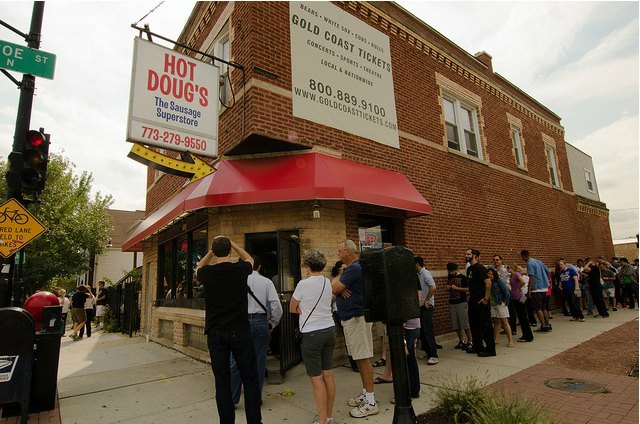You Love Waiting In Line For Restaurants
By Melissa McEwen in Food on May 14, 2014 6:00PM
A Chicago magazine poll recently asked its readers to vote on the “worst thing about Chicago restaurants.” The winner, with over half the votes, was “Restaurants that won't take reservations. You just show up—and wait.” But actions speak louder than words, and people’s actions show they are fine with waiting in line for their meal.
Why the paradox? A line at a restaurant is more than just an inconvenience. According to University of Chicago Business Operations Professor Laurens Debo, who studies such queues, a world without queues is impossible. “In operations management it’s a fundamental thing that queues are inevitable. Whenever there is a service and there is some uncertainty in the time the patron needs the service, the time it takes to serve the customers or both – there will be a queue.”
But while queues might be inevitable, why do some restaurants seem to choose the most inconvenient ways of managing them – from forcing customers to wait in line, to putting them on a paper list and asking them to check back to see if they might have a table available for them later? These methods shift costs to the customer, who must pay in their own time.
And any economist can tell you that time is money, but the cost of that time will vary per person depending on their personal “opportunity cost” – which is the cost of the highest value thing they could be doing instead of waiting in line. For a freelance writer or academic, who could theoretically be working on a Friday night, the cost might be much higher than for a 9-5 office worker who would otherwise be watching Netflix. A long wait might not deter the latter type; they might even enjoy it if they use the delay to drink, snack and hang out with their friends at a nearby bar.
University of Chicago Economist Gary Becker, who passed away recently, mused on why one restaurant in California had a long line while another nearby almost identical seafood restaurant did not. Classical economic theory would dictate that the restaurant with the queue could raise its prices. He theorized that lines are a boon for the restaurant and they actually increase the value of the meal to consumers. Debo notes that people like to be in what’s considered a hotspot. “Becker’s paper tells us that irrespective of quality, people would rather have a meal in popular restaurant,” he said. “It’s psychological.”
Debo says that there are other reasons too for nurturing long lines. “In a tourist area, patrons often don’t know which restaurants are good or bad,” Debo said. “A queue can be a signal of quality when there is this type of uncertainty. Consumers will join the queue as long as the value is higher than the cost. As a long line increases the perceived value for the tourist, they will tolerate long lines (and complain at the same time).”
Even in the age of restaurant review apps, a queue might be valuable in signalling quality, especially in high-saturation areas like the West Loop where the number of highly-rated restaurants can seem overwhelming to consumers.
Most studies on queues in restaurants show they are most common in tourist areas, but they also occur when restaurants have few substitutes (try finding another Macanese restaurant in Chicago besides Fat Rice, or Cronuts besides at Dominque Ansel… you can’t), or have generated significant buzz. Or both. The infamous lines at Hot Dougs have recently gotten even longer because people know it's closing, possibly forever, soon, and they might not get another chance to eat there ever again.
But Debo points out this buzz might not last forever. Smart line generators will work to build a long term investment (books, opening other restaurants, etc.) off of the buzz before it fades. And fading is as inevitable as queues.
Old-fashioned lines don’t have a ton of administrative fees. Some restaurants take reservations, but that costs them – either through paying someone to take calls and write them down, or the financial cut that services like Opentable take. A few restaurants in Chicago have experimented with queuing systems that provide more transparent information to consumers, such as Seatme at Little Goat, but those have costs as well. Debo said that as more competitors enter queue-management markets, costs should decrease. And just recently they have as Yelp just launched a free online reservation system.
Even when it does make sense, the strategy of raising prices also has some unexpected costs as well, even when it makes sense economically. Some restaurants have been able to get away with it to a limited extent – like by offering cheaper tickets on weeknights, which are typically lower-demand, at Elizabeth, Next and Alinea. But too much variable pricing is likely to activate primal notions of unfairness and accusations of gouging – a fact Nick Kokonas brought up when discussing why he doesn’t use the most economically “efficient” option for pricing his restaurant tickets. Despite that, Debo thinks that variable pricing may become more and more common in the restaurant industry, as it has among airlines.
Another option is to increase supply by rearranging and adding more seats, but that can also be difficult for many owners and managers. Debo said that for many restaurants, it’s not just about the money – it’s also a labor of love. Adrienne Lo of Fat Rice told Eater, “If we added more seats, it wouldn't be Fat Rice or the Fat Rice experience where you can hear the kitchen and its a loud raucous environment.”
So as much as you hate the lines, there is a reason they are there. And as long as people put up with them, they aren’t going away anytime soon. As Debo remarked, “People say they hate lines, and people get in them anyway.”
